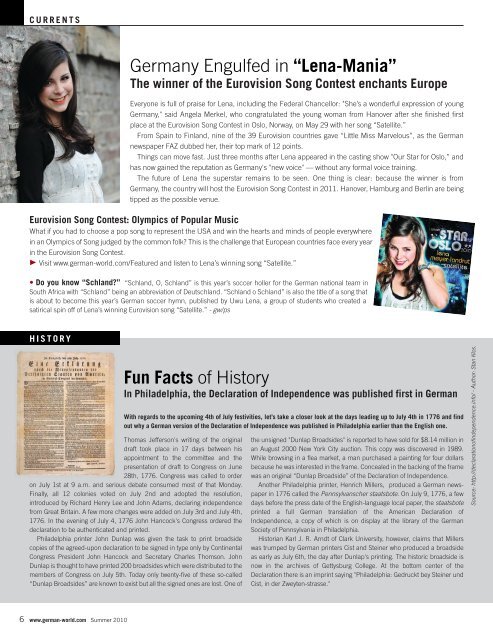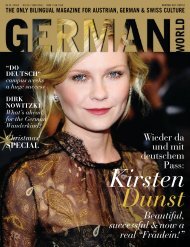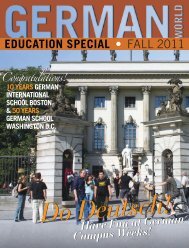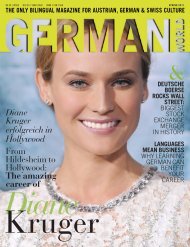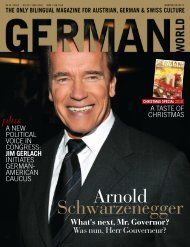Q'orianka Kilcher - german world magazine
Q'orianka Kilcher - german world magazine
Q'orianka Kilcher - german world magazine
Create successful ePaper yourself
Turn your PDF publications into a flip-book with our unique Google optimized e-Paper software.
6<br />
CURRENTS<br />
Germany Engulfed in “Lena-Mania”<br />
The winner of the Eurovision Song Contest enchants Europe<br />
Everyone is full of praise for Lena, including the Federal Chancellor: "She’s a wonderful expression of young<br />
Germany," said Angela Merkel, who congratulated the young woman from Hanover after she finished first<br />
place at the Eurovision Song Contest in Oslo, Norway, on May 29 with her song “Satellite.”<br />
From Spain to Finland, nine of the 39 Eurovision countries gave “Little Miss Marvelous”, as the German<br />
newspaper FAZ dubbed her, their top mark of 12 points.<br />
Things can move fast. Just three months after Lena appeared in the casting show "Our Star for Oslo,” and<br />
has now gained the reputation as Germany's "new voice" — without any formal voice training.<br />
The future of Lena the superstar remains to be seen. One thing is clear: because the winner is from<br />
Germany, the country will host the Eurovision Song Contest in 2011. Hanover, Hamburg and Berlin are being<br />
tipped as the possible venue.<br />
Eurovision Song Contest: Olympics of Popular Music<br />
What if you had to choose a pop song to represent the USA and win the hearts and minds of people everywhere<br />
in an Olympics of Song judged by the common folk? This is the challenge that European countries face every year<br />
in the Eurovision Song Contest.<br />
� Visit www.<strong>german</strong>-<strong>world</strong>.com/Featured and listen to Lena’s winning song “Satellite.”<br />
• Do you know “Schland?” “Schland, O, Schland” is this year’s soccer holler for the German national team in<br />
South Africa with “Schland” being an abbreviation of Deutschland. “Schland o Schland” is also the title of a song that<br />
is about to become this year’s German soccer hymn, published by Uwu Lena, a group of students who created a<br />
satirical spin off of Lena’s winning Eurovision song “Satellite.” - gw/ps<br />
HISTORY<br />
Thomas Jefferson's writing of the original<br />
draft took place in 17 days between his<br />
appointment to the committee and the<br />
presentation of draft to Congress on June<br />
28th, 1776. Congress was called to order<br />
on July 1st at 9 a.m. and serious debate consumed most of that Monday.<br />
Finally, all 12 colonies voted on July 2nd and adopted the resolution,<br />
introduced by Richard Henry Lee and John Adams, declaring independence<br />
from Great Britain. A few more changes were added on July 3rd and July 4th,<br />
1776. In the evening of July 4, 1776 John Hancock's Congress ordered the<br />
declaration to be authenticated and printed.<br />
Philadelphia printer John Dunlap was given the task to print broadside<br />
copies of the agreed-upon declaration to be signed in type only by Continental<br />
Congress President John Hancock and Secretary Charles Thomson. John<br />
Dunlap is thought to have printed 200 broadsides which were distributed to the<br />
members of Congress on July 5th. Today only twenty-five of these so-called<br />
“Dunlap Broadsides” are known to exist but all the signed ones are lost. One of<br />
www.<strong>german</strong>-<strong>world</strong>.com Summer 2010<br />
Fun Facts of History<br />
In Philadelphia, the Declaration of Independence was published first in German<br />
With regards to the upcoming 4th of July festivities, let’s take a closer look at the days leading up to July 4th in 1776 and find<br />
out why a German version of the Declaration of Independence was published in Philadelphia earlier than the English one.<br />
the unsigned "Dunlap Broadsides" is reported to have sold for $8.14 million in<br />
an August 2000 New York City auction. This copy was discovered in 1989.<br />
While browsing in a flea market, a man purchased a painting for four dollars<br />
because he was interested in the frame. Concealed in the backing of the frame<br />
was an original “Dunlap Broadside” of the Declaration of Independence.<br />
Another Philadelphia printer, Henrich Millers, produced a German newspaper<br />
in 1776 called the Pennsylvanscher staatsbote. On July 9, 1776, a few<br />
days before the press date of the English-language local paper, the staatsbote<br />
printed a full German translation of the American Declaration of<br />
Independence, a copy of which is on display at the library of the German<br />
Society of Pennsylvania in Philadelphia.<br />
Historian Karl J. R. Arndt of Clark University, however, claims that Millers<br />
was trumped by German printers Cist and Steiner who produced a broadside<br />
as early as July 6th, the day after Dunlap's printing. The historic broadside is<br />
now in the archives of Gettysburg College. At the bottom center of the<br />
Declaration there is an imprint saying "Philadelphia: Gedruckt bey Steiner und<br />
Cist, in der Zweyten-strasse."<br />
Source: http://declarationofindependence.info/ - Author: Stan Klos.


